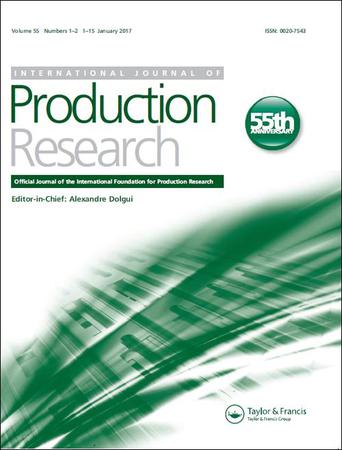基于自适应人工蜂群的批量加工混合车间调度
IF 7
2区 工程技术
Q1 ENGINEERING, INDUSTRIAL
International Journal of Production Research
Pub Date : 2023-11-09
DOI:10.1080/00207543.2023.2279145
引用次数: 0
摘要
具有现实约束的混合流水车间调度问题(HFSP)得到了广泛的研究;然而,在中间阶段的批处理机器(BPM)的HFSP很少被研究。本研究考虑了冷热铸造过程中具有BPM的HFSP,并提出了一种自适应人工蜂群(AABC)来最小化完工时间。为了得到高质量的解,实现了采用蜂群阶段和自适应搜索步骤的自适应搜索过程。自适应搜索步骤由进化质量和自适应阈值决定,可以是旁观蜂阶段,也可以是合作蜂阶段,也可以是空白阶段。在一个被雇佣蜂群的改进方案和另一个蜂群的未改进方案之间进行合作。构造了6个搜索算子,并对搜索算子进行自适应调整。一个新的侦察阶段也被给予。给出并证明了一个下界。进行了大量的实验。计算结果验证了合作等新策略的有效性和效率,并且在考虑的问题上,AABC比现有文献中的方法能获得更好的结果。关键词:冷热铸造人工蜂群混合流水车间调度问题批量加工机披露声明作者未报告潜在利益冲突数据可用性声明支持本研究的数据在第5.1节的第一段中描述。本研究得到国家自然科学基金资助[61573264]。Wang jing Wang, 2017年毕业于中国武汉湖北工业大学工业工程专业,2020年毕业于中国福州大学工业工程专业,获硕士学位。她目前在武汉理工大学自动化学院攻读博士学位。她目前的研究兴趣包括制造系统的智能优化和调度。雷德明,1996年获西安交通大学应用数学专业硕士学位,2005年获上海交通大学自动化科学与工程专业博士学位。他目前是武汉理工大学自动化学院的教授。他发表了100多篇期刊论文。他目前的研究兴趣包括智能系统优化和控制,以及生产调度。唐洪涛,2008年毕业于武汉理工大学材料成型与控制工程专业,2014年毕业于华中科技大学数字材料成型专业,获博士学位。他目前是武汉理工大学机电工程学院的副教授。主要研究方向为数字化设计、数字化制造、智能优化算法及应用。本文章由计算机程序翻译,如有差异,请以英文原文为准。
An adaptive artificial bee colony for hybrid flow shop scheduling with batch processing machines in casting process
AbstractHybrid flow shop scheduling problem (HFSP) with real-life constraints has been extensively considered; however, HFSP with batch processing machines (BPM) at a middle stage is seldom investigated. In this study, HFSP with BPM at a middle stage in hot & cold casting process is considered and an adaptive artificial bee colony (AABC) is proposed to minimise makespan. To produce high quality solutions, an adaptive search process with employed bee phase and adaptive search step is implemented. Adaptive search step, which may be onlooker bee phase or cooperation or empty, is decided by evolution quality and an adaptive threshold. Cooperation is performed between the improved solutions of one employed bee swarm and the unimproved solutions of another swarm. Six search operators are constructed and search operator is adaptively adjusted. A new scout phase is also given. A lower bound is provided and proved. Extensive experiments are conducted. The computational results validate that new strategies such as cooperation are effective and efficient and AABC can obtain better results than methods from existing literature on the considered problem.Keywords: Hot & cold castingartificial bee colonyhybrid flow shop scheduling problembatch processing machines Disclosure statementNo potential conflict of interest was reported by the author(s).Data availability statementData supporting this study are described in the first paragraph of Section 5.1.Additional informationFundingThis work is supported by the National Natural Science Foundation of China [61573264].Notes on contributorsJing WangJing Wang received the bachelor's degree in industrial engineering from the Hubei University of Technology, Wuhan, China, in 2017 and the master's degree in industrial engineering from Fuzhou University, Fuzhou, China, in 2020. She is currently pursuing the doctoral degree with the School of Automation, Wuhan University of Technology, Wuhan, China. Her current research interest includes manufacturing systems intelligent optimisation and scheduling.Deming LeiDeming Lei received the master's degree in applied mathematics from Xi'an Jiaotong University, Xi'an, China, in 1996 and the doctoral degree in automation science and engineering from Shanghai Jiaotong University, Shanghai, China, in 2005. He is currently a professor with the School of Automation, Wuhan University of Technology, Wuhan, China. He has published over 100 journal papers. His current research interests include intelligent system optimisation and control, and production scheduling.Hongtao TangHongtao Tang received the bachelor's degree in material molding and control engineering from the Wuhan University of Technology, Wuhan, China, in 2008, and the doctoral degree in digital material forming from Huazhong University of Science and Technology, Wuhan, China, in 2014. He is currently an associate professor with the School of Mechanical and Electrical Engineering, Wuhan University of Technology, Wuhan, China. His current research interest includes digital design, digital manufacturing and intelligent optimisation algorithm and application.
求助全文
通过发布文献求助,成功后即可免费获取论文全文。
去求助
来源期刊

International Journal of Production Research
管理科学-工程:工业
CiteScore
19.20
自引率
14.10%
发文量
318
审稿时长
6.3 months
期刊介绍:
The International Journal of Production Research (IJPR), published since 1961, is a well-established, highly successful and leading journal reporting manufacturing, production and operations management research.
IJPR is published 24 times a year and includes papers on innovation management, design of products, manufacturing processes, production and logistics systems. Production economics, the essential behaviour of production resources and systems as well as the complex decision problems that arise in design, management and control of production and logistics systems are considered.
IJPR is a journal for researchers and professors in mechanical engineering, industrial and systems engineering, operations research and management science, and business. It is also an informative reference for industrial managers looking to improve the efficiency and effectiveness of their production systems.
 求助内容:
求助内容: 应助结果提醒方式:
应助结果提醒方式:


